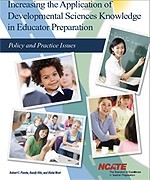 “If we do not integrate what we know about how children grow and learn, we run the risk of losing another generation of learners.
“If we do not integrate what we know about how children grow and learn, we run the risk of losing another generation of learners.
…a growing amount of developmental research confirms that as many of half of all students become chronically disengaged, contributing to the high dropout rates and achievement gaps that have plagued our schools for a generation.”
Research shows that learning improves when teachers address students’ emotional, social, and cognitive needs. Unfortunately, this research is not widely used.
“What can educators and schools do to help students from challenging family backgrounds, or those who simply lack the motivation to learn?”
James Comer and Robert Pianta found discouraging answers to that question in a new report commissioned by the National Council for the Accreditation of Teacher Education released this week.
Despite the understanding of how children and adolescents grow and learn, schools are not applying this knowledge. Neither are teacher preparation programs.
“If teachers don’t know how to address their students’ emotional, cognitive, and social needs, they face an uphill battle in improving student achievement, especially among at-risk populations facing persistent achievement gaps.
Report: Schools, Teacher Ed Programs Ignore How Kids Really Learn
http://voices.washingtonpost.com/answer-sheet/research/report-schools-teacher-ed-prog.html
Read the complete article by James P. Comer, associate dean of medicine at Yale University and co-founder of the Yale Child Study Center School Development Program, and Robert Pianta, dean of the Curry School of Education at the University of Virginia. They co-chaired a panel on developmental science issues for NCATE, responsible for assuring the quality of programs that educate the nation’s teachers and school leaders.






Thank you this is a great report.